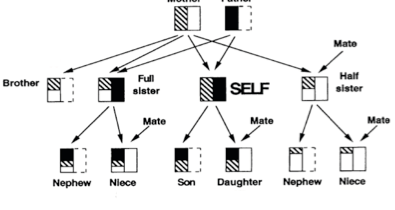
Evolution is all about passing on your genes. Reproduction is obviously an important part of that, hence why animals are willing to go to such extremes to mate. This makes humans' lack of fertility rather baffling. Women undergo menopause, effectively eliminating their chance of having children. Men don't have a similar fertility drop off, but sexual dysfunction still affects almost 1 in 3 of them. Why did evolution leave us with such poor reproductive capacity? Perhaps it was actually deliberate. Was there an evolution of infertility?
Grandmothers: pinnacle of evolution
Women are born with all the eggs they'll ever have. Around the age of 40 they run out; eliminating their chance of having any more children. Chimps have a similar life history, although you'd never know it since they tend to die around that age as well. Humans, on the other hand, have evolved to live much longer. Yet female fertility hasn't changed to match, leading to an evolution of infertility. Why?
Some contend that this was simply accidental. Men don't stop being fertile in old age, so it may have been beneficial for them to evolve a long life. Since both sexes share most genes, women also got a longer life by tagging along. Now, this might sound like a reasonable explanation for how this evolution of infertility originally occurred, but it can't explain why it stuck around. Why did evolution not start selection for women to make reproductive use of all this extra lifespan?
Enter kin selection. This is the observation that evolution is all about passing on genes. Since you share a lot of genes with your close relatives helping them can sometimes help your genes even more than reproducing yourself. For instance, you would share 50% of your genes with any of your children. They then mix their genes with someone to create your grandchildren, who would now share 25% of your genes. Thus helping your kid have 3 grandchildren would be better than you have an extra child (since (0.25 x 3) > 0.5).
Hence the biological saying "I would lay down my life for two brothers or eight cousins."
And that is the essence of why female fertility continues to stop. They benefit their genes more helping successive generations raise their kids than by having more kids of their own. This "grandmother hypothesis" is well supported by evolutionary psychology. Now, I've been a fairly vocal critic of that field, but this is one case where EvoPsych did it right. They examined families in loads of different cultures - even hunter-gatherer ones - and found that having a living grandmother consistently increases the chance of grandchildren doing well.
The deliberate evolution of infertility in men?
So we can explain the evolution of infertility in women. Or rather, the lack of evolution for extra fertility. But what about men? Almost 1/3 of them suffer from some sort of sexual dysfunction, with erectile dysfunction and premature ejaculation taking the top spots.
Could kin selection also explain this? If 1/3 males isn't reproducing then they could be helping raise other children. Perhaps we need the "uncle hypothesis" as well as the "grandmother hypothesis". However, a recently published paper has an alternative perspective.
They note that most of these "dysfunctions" don't actually prevent someone from reproducing. Sure they might make the process a lot less enjoyable, but it can still happen. For instance, whilst erectile dysfunction is reported in between 5 - 20% of the population (depending on what country and age group you survey) it is only frequent enough in about 2% of people to severely prohibit reproduction.
In other words, the most common male dysfunctions just stop reproduction being as fun. Which leads to these researchers' hypothesis: evolution doesn't care if you're having fun. As long as you reproduce the great Darwin in the sky is happy. Thus natural selection allowed these issues to become so common because it had not reason to act against them.
References
Apostolou, M. (2015). Sexual Dysfunctions in Men: An Evolutionary Perspective. Evolutionary Psychological Science, 1-12.
Hawkes, K., & Coxworth, J. E. (2013). Grandmothers and the evolution of human longevity: a review of findings and future directions. Evolutionary Anthropology: Issues, News, and Reviews, 22(6), 294-302.

